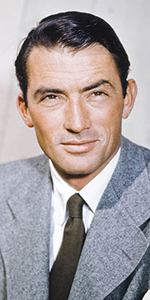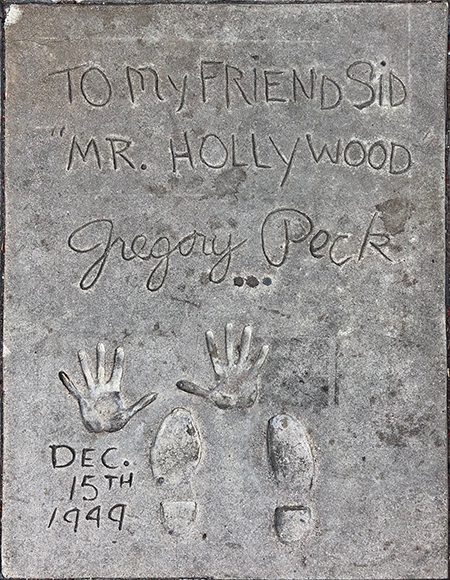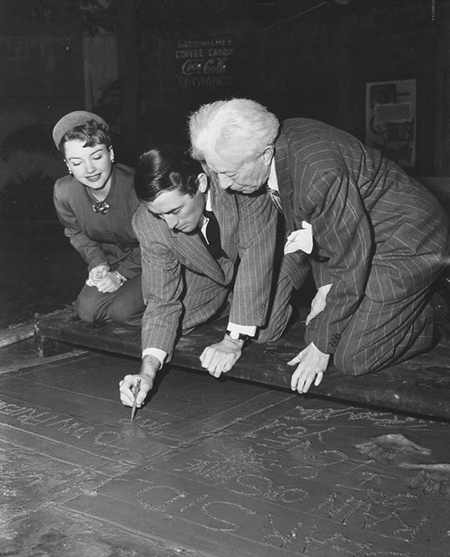 |
 |
 |
 |
 |
| Gregory Peck, date unknown. |
| |
|
 |
|
| |
| |
| |
| |
|
|
| Gregory Peck
with Anne Baxter |
 |
| Forecourt Ceremony held on Thursday, December 15, 1949 |
| |
Born: Eldred Gregory Peck, April 5, 1916, in La Jolla, California
Age at the time of the ceremony: 33
Died:
June 12, 2003, in Los Angeles, California, age 87 |
| |
Gregory Peck is another film great. An actor with a tremendous charm and intensity, Peck became a very popular leading man in the mid 1940s, and continued to appear in one hit film after another into the 1980s. His gift was so singular that no one ever attempted to imitate him.
English-Irish on his father's side, and English-Scots on his mother's, Peck was raised as a Catholic; alas, his parents divorced when Eldred was only five. He was sent to live with his maternal grandmother, who took the young lad to the movies every week. At age ten, he was attending St. John's Military Academy in Los Angeles. Peck saw King of Kings at the Chinese during its run in 1927. With grandmother passing away when he was 14, he went to live with his father in San Diego, graduating high school and then attending San Diego State University. It was here that Peck became interested in theatre and public speaking in addition to being on the track team.
Wanting to be a doctor, Peck switched to UC Berkeley, and took up rowing. He was pulled into Berkeley's Little Theatre and coached by Edwin Duerr. Peck starred in five plays his senoir year. Upon graduating, Peck dropped the "Eldred" and moved to New York, working with acting teacher Sanford Meisner. While studying with Martha Graham, Peck injured his back, which would disqualify him from military service. He worked as a tour guide at the World's Fair in New York, and spent a summer at the Barter Theatre in Abingdon Virginia.
Peck made his Broadway debut as the lead in The Morning Star in September 1942.
Hollywood came calling; Peck signed with 20th Century-Fox.
Peck's first film, Days of Glory (released in June 1944) had him second-billed under his leading lady Tamara Toumanova. His next film got him top-billing and an Oscar nomination: The Keys of the Kingdom (which played the Chinese in January 1945). His next was to co-star with Ingrid Bergman in the whopping hit Spellbound (which played the Chinese in November 1945). Peck was now on top, but critics found him stiff and difficult to take seriously.
The Yearling (released in December 1946) changed all that. His warm performance brought many around, while his bad-guy role in the decidedly odd western Duel in the Sun (released in December 1946) made everyone question his dramatic judgement again. After Cary Grant turned down the lead in Gentleman's Agreement (which played the Chinese in March 1948), Peck accepted the role with alacrity, scoring a triumph in one of the most impactful films of that year.
In 1947, Peck, Mel Ferrer and Dorothy McGuire founded the La Jolla Playhouse, which has since become one of the theatre's most innovative producers.
After doing another Selznick / Hitchcock film, The Paradine Case (which played the Chinese in October 1948), Peck co-starred with Anne Baxter in the western Yellow Sky (which played the Chinese in January 1949). The two young stars were imprinted at the Chinese together during a rainy evening just prior to the World Premiere of Peck's new film Twelve O'Clock High on Wednesday, December 21, 1949 (the film would open at the Chinese on Sunday, December 25, 1949).
Loaned out to Warner Bros., Peck starred in the title role of Captain Horatio Hornblower (released in April 1951). Then did David and Bathsheba (which played the Chinese in August 1951), The Snows of Kilimanjaro (played the Chinese in October 1952), Roman Holiday (released in September 1953), and The Man in the Gray Flannel Suit (played the Chinese in April 1956).
Peck distinguished himself as Captain Ahab in John Huston's film of Moby Dick (released in June 1956), starred in and co-produced The Big Country (released in October 1958), and played F. Scott Fitzgerald in Beloved Infidel (which played the Chinese in November 1959), and the ensemble piece On the Beach (played the Chinese in December 1959).
After leading a group trying to blow up The Guns of Navarone (released in June 1961), and proposing to Debbie Reynolds in How the West Was Won (released in February 1963), Peck starred in the role he was born to play: attorney Atticus Finch in the film of To Kill a Mockingbird (which played the Chinese in May 1963). Peck's qualities of compassion and understanding pervade this much-beloved picture. Peck recieved the Oscar for his performance, and the film became his favorite.
Peck continued to search for interesting films to do; westerns, such as Mackenna's Gold (released in May 1969), sci-fi, Marooned (released in December 1969), and the supernatural, The Omen (released in June 1976). Despite disliking the character's politics, he wanted to play the title role in MacArthur (released in July 1977), and really strecthed himself by playing Josef Mengele in The Boys from Brazil (which played the Chinese in October 1978).
He played Abraham Lincoln in the television mini-series The Blue and the Gray, aired on CBS in 1982, and played Monsignor Hugh O'Flaherty in the mini-series The Scralet and the Black, aired over CBS in October 1983. Audiences didn't guite know what to make of his turn in Old Gringo (released in October 1989), so it flopped. Peck's last real film was Other People's Money (released in October 1991).
Peck was pesident of the Academy of Motion Picture Arts and Sciences from 1967 to 1970, he was chairman of the Motion Picture and Television Relief Fund (operators of the Motion Picture and Television Country House and Hospital, founded by Jean Hersholt) in 1971, and National Chairman of the American Cnacer Society in 1966.
Peck died at home with his second wife, Veronique at his side. At his funeral, the eulogy was read by Brock Peters, the actor who Peck's character defended in To Kill a Mockingbird. |
|
|
|
|
| |
 |
 |
| Grauman's Chinese Theatre, Hollywood, California. Gregory Peck Forecourt block. Executed by Jean Klossner, Thursday, December 15, 1949. 38 x 50 inches. |
 |
 |
 |
| Grauman's Chinese Theatre, Hollywood, California. Gregory Peck / Anne Baxter Forecourt ceremony, Thursday, December 15, 1949. Anne Baxter (who went first) looks on as Gregory Peck mades his inscription as Sid Grauman observes. |
|
|